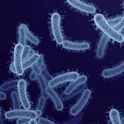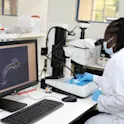World Mosquito Day: How the pest’s diet could lead to discovery of new antimalarial drug
By Suzanna Burgelman/ PhD student and fellow Trizah Koyi Milugo, ICIPE PhD student and fellow Trizah Koyi Milugo. Image: Trizah Koyi Milugo A preventable disease, malaria still threatens millions of people around the world. World Mosquito Day raises awareness about malaria and its transmission via mosquitos. Researchers such as PhD student Trizah Koyi Milugo focus their research on malaria control and prevention and, in her case, is researching the development of a novel tool for controlling malaria transmission. In 2019, 229m clinical cases of malaria occurred and 409,000 people died of the disease, most of them children in Africa. The disease is found in more than 100 countries worldwide, but roughly 70% of the world’s malaria burden is concentrated in Africa and India. Humans get infected with the malaria virus through mosquito bites. Other than malaria, mosquitos carry an array of dangerous diseases, such as dengue, zika, and west Nile virus. Mosquitos are the world’s deadliest creature. World Mosquito Day raises awareness about the dangers of mosquitos and the devastating consequences of malaria. Trizah Koyi Milugo, a PhD student at the International Center of Insect Physiology and Ecology (ICIPE), is currently researching the development of a novel tool for controlling […]














